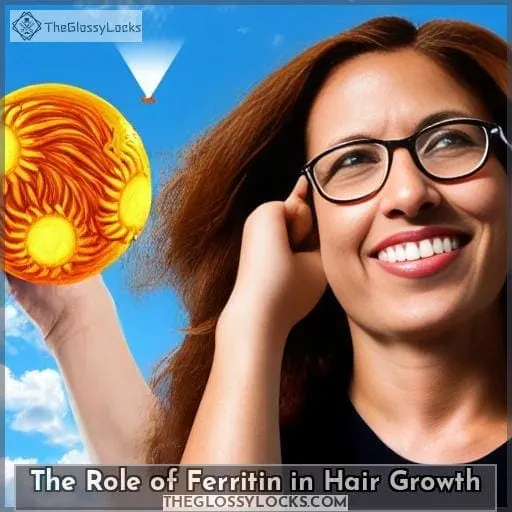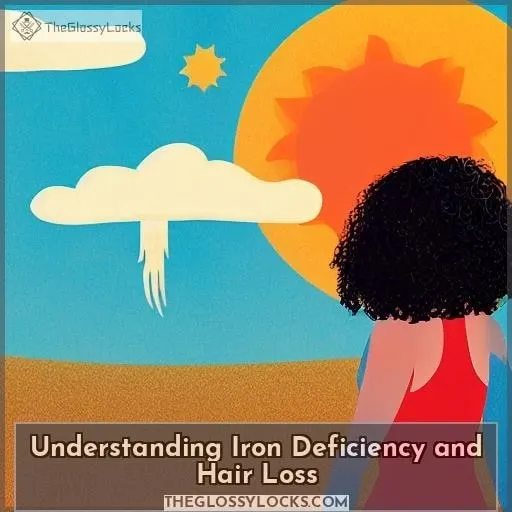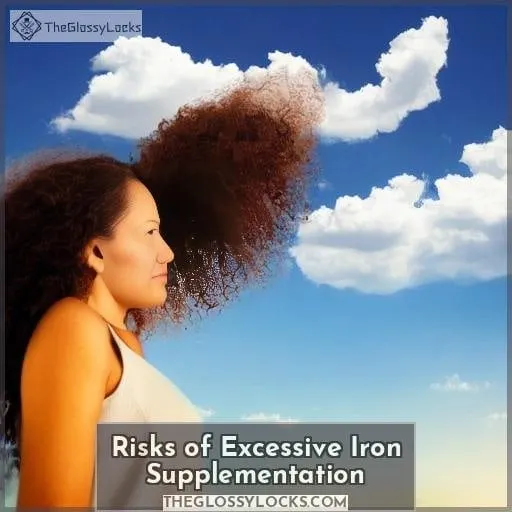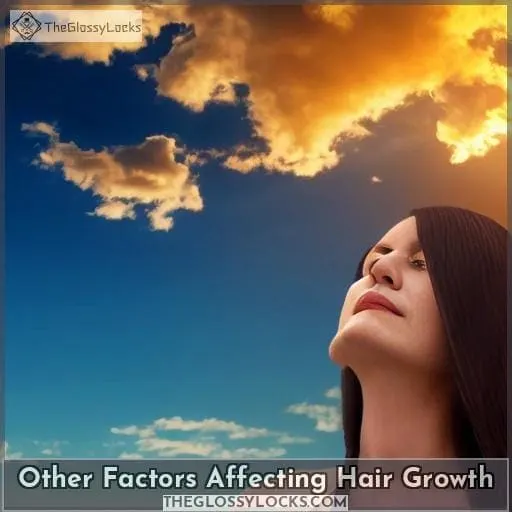This site is supported by our readers. We may earn a commission, at no cost to you, if you purchase through links.
Are you struggling with hair loss? If so, understanding the role that ferritin plays in it can be incredibly helpful.
Ferritin is a protein found in your bloodstream, and its primary purpose is to store iron. When ferritin levels are too low, this can lead to hair loss. But what’s the ideal level for healthy growth?
In this article, we’ll discuss how high ferritin should be for optimal hair growth. We’ll also cover factors affecting levels and strategies for increasing them safely. Additionally, we’ll touch on other elements of health that may contribute to strong locks, such as thyroid hormones and stress management.
With all these tips at hand, you’ll soon have a better idea of how best to support your own natural beauty!
Table Of Contents
- Key Takeaways
- The Role of Ferritin in Hair Growth
- Understanding Iron Deficiency and Hair Loss
- Factors Affecting Ferritin Levels
- Recommended Ferritin Levels for Hair Growth
- Risks of Excessive Iron Supplementation
- Strategies for Increasing Ferritin Levels
- Other Factors Affecting Hair Growth
- Monitoring Ferritin Levels for Hair Growth Progression
- Frequently Asked Questions (FAQs)
- What other nutrients are important for healthy hair growth?
- Is there a link between hypothyroidism and hair loss?
- How long should I wait to see if dietary changes and supplements are working?
- What are the symptoms of an iron overdose?
- Is there a way to check if an underlying condition is causing my hair loss?
- Conclusion
Key Takeaways
- Ferritin stores iron in the bloodstream for healthy hair growth, and low ferritin levels can cause hair loss. Ferritin levels should be above 40 for optimal hair health.
- Vitamin D and zinc deficiencies are also contributors to hair loss, and gluten intolerance can prevent proper iron absorption, leading to low ferritin levels.
- Hypothyroidism may require medication alongside hair loss treatments, and low serum ferritin can lead to Androgenetic Alopecia or general thinning of the scalp.
- Strategies for increasing ferritin levels include eating iron-rich foods, adding vitamin C supplements to aid in absorption, and incorporating gluten-free foods, vitamin D, and zinc into the diet.
- It is important to wait at least three months to see if dietary changes and supplements are working for hair growth, and to consult a doctor for a ferritin test if hair loss persists.
The Role of Ferritin in Hair Growth
Maintaining healthy levels of iron in your body is essential for the growth and maintenance of beautiful, strong locks. Ferritin is a protein that stores iron, so low ferritin levels can cause hair loss. Aiming for a ferritin level above 40 should help most people with hair loss, although some may be fine between 20-40.
Iron sources such as red meat or supplements improve iron absorption when combined with vitamin C-rich foods or drinks like orange juice and lemonade. Gluten intolerance prevents proper iron absorption, which can lead to low ferritin and further complicate diagnosis if not considered prior to treatment beginning.
Vitamin D deficiency has been linked to excessive hair fall, while zinc deficiency also contributes to this condition. Both need to be taken into account during diagnosis too since they influence how much impact maintaining adequate amounts of ferritin will have on restoring beauty back into balding areas.
Addressing an underlying medical issue like hypothyroidism could mean taking medication alongside using Rogaine – Minoxidil – which helps restore lost hairs but does not address any potential nutritional deficiencies that are causing these problems in the first place! Wait three months before retesting your blood results after making dietary changes because it takes time for those improvements to show up. Normal values range from 20-200 ng/mL in women and 20-500 ng/mL in men without signs of alopecia. Taking too much iron, however, is dangerous, so you must keep tabs on what you’re consuming always!
Understanding Iron Deficiency and Hair Loss
Understanding the link between iron deficiency and hair loss is essential if you want to keep your locks looking full and healthy. Iron-rich diets, Vitamin C intake, and Thyroid hormones all play a role in maintaining proper levels of ferritin for hair regrowth.
Low Serum Ferritin can lead to Androgenetic Alopecia or general thinning of the scalp due to a lack of dietary iron intake or absorption issues with Gluten intolerance. Eating an iron-rich diet combined with Vitamin C helps improve Iron levels as well as minimize symptoms associated with low serum ferritin such as fatigue, dizziness, brittle nails, etc.
Stress management through exercise routines, along with regular sleep patterns, also helps reduce hair loss while providing additional health benefits from improved hormone balance throughout the body system. If no improvement is seen after three months on these changes, it’s important that they be retested for their serum ferritin level since this could indicate other underlying conditions causing abnormal amounts of hair loss requiring doctor intervention before it progresses further into baldness.
Factors Affecting Ferritin Levels
You may be wondering what factors affect ferritin levels and how high they should be for hair growth. Diet and nutrition play a significant role, as do underlying medical conditions. It is important to understand the impact both of these have on our health in order to maintain healthy ferritin levels that promote hair growth.
Diet and Nutrition
You can support healthy hair growth by developing a diet rich in iron and vitamin C. Aim to eat gluten-free, plant-based foods that are high in iron, such as dark leafy greens and legumes. Vitamin C helps your body absorb more of the iron you take in, so try to include citrus fruits or bell peppers with meals.
Make sure your zinc intake is adequate too; this mineral plays an important role in maintaining healthy hair follicles. Monitor your serum ferritin level closely, as low levels indicate low iron stores which may contribute to hair loss over time.
Eating a balanced diet full of both vitamins and minerals is key for keeping up good health overall – including promoting strong, shiny locks!
Underlying Medical Conditions
It is important to investigate underlying medical conditions that may be causing low ferritin levels and subsequent hair loss. Low-carb diets, vitamin D deficiency, gluten intolerance, liver disease, and zinc deficiency can all lead to decreased ferritin levels in premenopausal women. Alopecia areata or chronic diffuse telogen hair loss could also prevent normal hair growth due to damage to the scalp’s follicles. It is best for patients with any of these issues who suffer from abnormal amounts of shedding or thinning strands to get tested for iron stores as soon as possible in order to restore their luscious locks!
Recommended Ferritin Levels for Hair Growth
Having a balanced ferritin level is essential for your hair to stay healthy and strong – don’t let it get out of whack! Generally, aiming for a ferritin above 40 is likely the best choice if you’re experiencing hair loss. This can be achieved through diet or supplementing with iron-rich foods plus vitamin C-rich foods to aid in absorption.
Vitamin D deficiency, zinc deficiency, liver disease, and hypothyroidism are all linked to low ferritin levels too and should be monitored accordingly. Additionally, red blood cells are responsible for carrying oxygen throughout the body, which may explain why some people experience fatigue when their iron stores drop below 15ng/ml.
It’s important to get an accurate diagnosis from your doctor before taking any action as there could be other underlying causes such as gluten intolerance that need addressing first. Then monitor progress using a regular Ferritin Test every three months or so until desired results have been achieved. If no improvements are seen within this period, it’s time to reassess iron levels again alongside Thyroid Health & other factors that might affect Hair Growth like Vitamin D & Zinc Deficiency intake, etc.
Ultimately, getting your Ferritin Levels back into balance will go a long way towards helping restore healthier-looking locks!
Risks of Excessive Iron Supplementation
Taking too much iron can be a dangerous game, so beware! It can lead to serious and potentially fatal consequences. Iron toxicity is one of the most common risks associated with excessive iron supplementation.
Before starting any supplementation, a ferritin test or blood test should be done to determine if someone has an iron overload. Too much supplemental iron may also interfere with thyroid hormones that are needed for hair growth and overall health.
High levels of supplemental iron may cause lower ferritin levels, which could result in symptoms such as fatigue, dizziness, and hair loss due to low stores of stored energy (iron deficiency anemia). Stress management techniques like exercise and regular sleep, along with adequate zinc intake, will help promote healthy hair growth while avoiding the risk factors associated with taking too much supplementary iron.
Remember to always consult your doctor before taking any supplements, including those containing excess amounts of elemental-iron or other minerals/vitamins!
Strategies for Increasing Ferritin Levels
If you’re looking to increase your ferritin levels for hair growth, two of the most important strategies are eating iron-rich foods and taking vitamin C supplements. Iron is essential for healthy hair growth, so it’s important that you incorporate foods like red meat, poultry, fish, and eggs into your diet. Vitamin C helps with iron absorption in the body, so make sure to add more fruits like oranges or strawberries to your meals as well.
Iron-rich Foods
Treat your hair loss and iron deficiency with an iron-rich diet! Iron is essential for the production of hemoglobin, which measures iron storage levels. Higher ferritin levels suggest enough iron in the body, so make sure you’re eating enough nutrient-dense foods that contain high amounts of this mineral.
Eating gluten-free foods can also help improve absorption, as well as adding vitamin D and zinc to your diet to aid growth. Look out for processed or packaged food, which may not provide you with enough natural sources to replenish ferritin lost through illness or inflammation.
Eat fresh fruits, vegetables, grains, and legumes daily to help increase your intake. Doing this regularly will ensure higher ferritin levels over time!
Vitamin C and Iron Absorption
Combining vitamin C-rich foods with iron-rich sources can help your body absorb iron more efficiently, allowing you to get the most from your meals. It is also important to ensure adequate intake of vitamin D and zinc, as deficiencies in these vitamins may contribute to hair loss.
Gluten intolerance can lead to poor absorption of iron, which in turn can cause ferritin loss and hair shedding. However, too much iron consumption on its own may also be dangerous. An overdose could result in abdominal pain, black or bloody stools, vomiting, and other symptoms.
Iron levels should not exceed 70 micro g l-1, as higher numbers stored by the body stores than the normal range (20-200 ng/ml) could lead to liver failure or hypothyroidism.
While thyroid hormones are essential for healthy metabolic functions, their lack does not necessarily mean baldness. This might point towards an underlying issue like low ferritin levels instead.
Other Factors Affecting Hair Growth
In order to have healthy hair growth, you need to pay attention not only to ferritin levels but also to other factors such as thyroid hormones, stress, and sleep. Thyroid hormones can affect the rate of your hair growth or loss; too much stress can lead to increased shedding, while getting adequate restful sleep is important for promoting new hair development. All these aspects should be taken into account when considering how high your ferritin level needs to be for optimal hair health.
Thyroid Hormones
Thyroid Hormones
If you’re feeling sluggish, have dry skin, or are cold-intolerant, it could be a sign that your body isn’t producing enough thyroid hormone. Lower-than-normal amounts of thyroid hormones can cause hair loss due to iron deficiency and ferritin loss.
Possible causes of poor iron absorption include gluten intolerance and zinc deficiency. Vitamin C helps with the absorption of the mineral. Rasheed et al and Deloche et al European Journal suggest cases of hypothyroidism linked to hair loss being mainly attributed to an iron imbalance in most cases.
Taking steps such as increasing dietary sources rich in both vitamin C and iron, along with ensuring adequate iodine intake, may help alleviate symptoms caused by low levels or imbalances regarding these two nutrients associated with hypothyroidism-related hair loss.
Stress and Sleep
You may find that managing stress and getting regular sleep can help improve your hair growth. Thyroid effects, iron deficiency, vitamin D, and zinc deficiencies are all potential risk factors for hair loss.
Stress management is especially important as it can be a major underlying condition behind the first signs of hypothyroidism, such as weight gain or fatigue. Regular sleep also plays an essential role in maintaining healthy levels of ferritin within the body because lack of rest can affect one’s sense of well-being, which could potentially lead to further medical complications.
With this in mind, finding ways to reduce stress through activities like yoga or meditation while making sure you get enough restful hours each night could greatly contribute to improving your overall health and well-being – including your hair!
Monitoring Ferritin Levels for Hair Growth Progression
Monitoring your metabolic markers is key to kick-starting healthy hair growth. Many earlier studies have shown that low ferritin levels may be a cause of hair loss in the general population, with menopausal women having a higher likelihood.
It’s important to discuss what the ideal ferritin level should be for those who are experiencing or trying to prevent hair loss. Iron sources such as red meat, poultry, and fish are great for increasing iron intake; however, it’s essential to monitor how much you consume so that not too much iron builds up in your system. An overdose can lead to severe health issues and even death.
Ferritin tests should also take into account any vitamin D deficiency or zinc deficiencies, which can also contribute towards excessive shedding of hairs, as well as other symptoms associated with these conditions like fatigue and dry skin.
If all signs point towards an underlying condition causing low ferritin levels, then treatment needs to begin immediately if there is any hope of reversing the damage done from falling victim to this issue before it gets worse over time!
Frequently Asked Questions (FAQs)
What other nutrients are important for healthy hair growth?
Apart from iron, other key nutrients important for healthy hair growth include vitamin C, zinc, and vitamin D. Eating foods rich in these vitamins can help promote healthy hair growth and luster. Additionally, managing stress levels as well as getting enough exercise and rest are all essential elements of a balanced lifestyle which contribute to strong locks.
Is there a link between hypothyroidism and hair loss?
Yes, there is a link between hypothyroidism and hair loss. A study found that women with hypothyroidism were four times more likely to experience excessive hair shedding than those without. So, it’s important to get your thyroid levels checked if you’re experiencing persistent or unusual amounts of hair loss.
How long should I wait to see if dietary changes and supplements are working?
Wait at least three months to see if your dietary changes and supplements are working. Make sure to monitor your progress, and if you don’t notice any improvements after this time, get a ferritin test done.
What are the symptoms of an iron overdose?
Symptoms of an iron overdose include abdominal pain, black or bloody stools, vomiting, irritability, increased heart rate, and decreased blood pressure. Don’t ignore these signs – seek medical help immediately if you experience them!
Is there a way to check if an underlying condition is causing my hair loss?
Yes, you can check if an underlying condition is causing your hair loss. See a doctor for a ferritin test to determine if low levels are the cause. Additional tests may be needed to identify any other conditions that could be contributing.
Conclusion
In conclusion, ferritin is an important factor for hair growth. Low levels of ferritin can lead to serious hair loss, but aiming for a ferritin level above 40 is likely to help. The best way to increase ferritin levels is to focus on iron-rich foods and combine them with vitamin C-rich foods for optimal absorption.
Keeping an eye on ferritin levels over time can help ensure that hair growth is progressing in the right direction, like a ship navigating a stormy sea. With the right knowledge and strategies, you can help restore your hair growth and keep it healthy.











